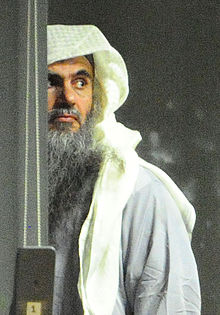
Back أبو قتادة الفلسطيني Arabic Абу Катада Bulgarian আবু কাতাদা ফিলিস্তিনি Bengali/Bangla Abu Qutada Catalan Abu Qatada German Abu Qutada Spanish Abu Qatada Basque ابوقتاده Persian Abou Qatada French Abu Qatada ID
Abu Qatada al-Filistini أبو قتادة الفلسطيني | |
|---|---|
 Abu Qatada during his deportation to Jordan on 7 July 2013 | |
| Born | Omar Mahmoud Othman 30 December 1960[1] |
| Other names | Abu Omar |
| Citizenship | Jordanian |
| Known for | Alleged links with terrorism, imprisonment without trial |
Omar Mahmoud Othman (Arabic: عمر بن محمود بن عثمان, romanized: 'Umar ibn Maḥmūd ibn 'Uṯmān; born 30 December 1960),[a] better known as Abu Qatada al-Filistini (/ˈɑːbuː kəˈtɑːdə/ ⓘ AH-boo kə-TAH-də; Arabic: أبو قتادة الفلسطيني, romanized: 'Abū Qatāda al-Filisṭīnī), is a Salafi[2][3] cleric and Jordanian national. Abu Qatada was accused of having links to terrorist organisations and frequently imprisoned in the United Kingdom without formal charges or prosecution before being deported to Jordan, where he was acquitted of multiple terrorism charges.[4][5][6]
Abu Qatada claimed asylum in the United Kingdom in 1993 on a forged passport. In 1999, he was convicted in absentia in Jordan of planning thwarted terror plots during Jordan's millennium eve and was sentenced to lifetime imprisonment with hard labour.[4] Abu Qatada was repeatedly imprisoned and released in the United Kingdom after he was first detained under anti-terrorism laws in 2002 but was not prosecuted for any crime.[7][8][9] The Algerian government described Abu Qatada as being involved with Islamists in London and possibly elsewhere.[10][11] After initially barring the United Kingdom from deporting Abu Qatada to Jordan, in May 2012 the European Court of Human Rights denied him leave to appeal against deportation.[12][13]
On 12 November 2012, the UK Special Immigration Appeals Commission (SIAC) upheld Abu Qatada's appeal against deportation and released him on restrictive bail conditions. The Home Secretary Theresa May said the government would appeal against the decision.[14] He was deported to Jordan on 7 July 2013, after the UK and Jordanian governments agreed and ratified a treaty satisfying the need for clarification that evidence potentially gained through torture would not be used against him in his forthcoming trial.[15]
On 26 June 2014, Abu Qatada was retried as is required by the Jordanian legal system if the defendant is returned to the country.[4] He was found not guilty by a Jordanian court of terrorism charges relating to one alleged 1999 plot. He remained in prison pending a verdict that was due September 2014 on a second alleged plot.[5][6] On 24 September 2014, a panel of civilian judges sitting at Amman's State Security Court cleared him of being involved in a thwarted plot aimed at Western and Israeli targets in Jordan during the millennium celebrations in 2000 due to "insufficient evidence".[4] Evidence used to convict him in the previous trial were overturned, per the treaty signed between the United Kingdom and Jordan, as they may have been potentially acquired through torture.[4]
Despite his history with militancy, scholar of Islam Daniel Lav argues that it should not hide his scholarly credentials in traditional Islamic studies, as "he certainly has connections to al-Qaʻida, but he is also the author of a polemic against the theological views of a nineteenth-century rector of al-Azhar, coauthor of a reference work on the eleventh-century scholar Ibn Hazm's evaluations of transmitters of hadith, and editor of an influential twentieth-century Wahhabi work of theology."[16] In the same tone, Victoria Brittain, a former associate foreign editor of The Guardian, and who knows him personally, also says that "the man behind the myth is a scholar with wide intellectual and cultural interests. He wrote books while he was in prison. His home is filled with books."[17]
- ^ "Abu Qatada".
- ^ "Jordanian cleric Abu Qatada acquitted of terror charges". america.aljazeera.com. Retrieved 5 January 2016.
- ^ Cesari, Jocelyne (25 July 2013). Why the West Fears Islam: An Exploration of Muslims in Liberal Democracies. Palgrave Macmillan. ISBN 9781137258205.
- ^ a b c d e "Abu Qatada cleared of terror charges". BBC News. Archived from the original on 24 September 2014.
- ^ a b McElroy, Damien. "Abu Qatada found not guilty of terror offences by Jordan court". The Daily Telegraph. Archived from the original on 26 June 2014.
- ^ a b "Jordan court finds Abu Qatada not guilty of terror plot". BBC News. Archived from the original on 26 June 2014.
- ^ "Cleric held as terror suspect". BBC News. 25 October 2002.
- ^ "Government says will deport radical cleric Abu Qatada". Reuters. 17 April 2012.
- ^ Richard Norton-Taylor (14 February 2012). "Why is Abu Qatada not on trial?". Comment is free. Retrieved 22 February 2012.
- ^ Government of Algeria (17 April 2003). "Report of Algeria on the implementation of United Nations Security Council resolution 1455 (2003)". United Nations. p. 14. Retrieved 22 February 2012.
- ^ Paul Harris; Antony Barnett; Burhan Wazir; Kate Connolly (5 May 2002). "Britain's most wanted". The Observer. Retrieved 22 February 2012.
- ^ Reuters, "Britain: Radical Cleric Faces Setback in Court Over Efforts to Deport Him", reprinted by The New York Times, 9 May 2012.
- ^ Travis, Alan (9 May 2012). "Abu Qatada deportation appeal rejected by human rights court". The Guardian. Retrieved 13 November 2012.
- ^ "Abu Qatada wins appeal against deportation". BBC News. 12 November 2012. Retrieved 12 November 2012.
- ^ "Abu Qatada deported from Britain". BBC. 7 July 2013.
- ^ Daniel Lav, Radical Islam and the Revival of Medieval Theology, Cambridge University Press (2012), p. 2.
- ^ Victoria Brittain (7 July 2013), "I know Abu Qatada – he's no terrorist", The Guardian. Retrieved 4 September 2019.
Cite error: There are <ref group=lower-alpha> tags or {{efn}} templates on this page, but the references will not show without a {{reflist|group=lower-alpha}} template or {{notelist}} template (see the help page).
© MMXXIII Rich X Search. We shall prevail. All rights reserved. Rich X Search